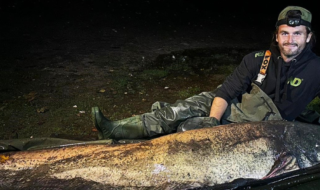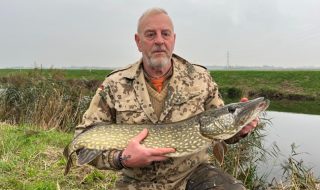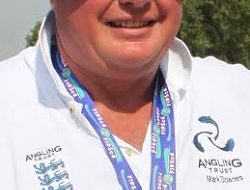Eleven angling, fisheries, shooting and countryside organisations have joined forces to call for cormorants and goosanders to be added to the General Licence as part of a National Management Plan because of the damage they are doing to fish stocks on rivers and lakes.
They have issued a joint statement in advance of the imminent conclusion of a review into the licencing of control of piscivorous birds which is being carried out by DEFRA, with input from Natural England, the RSPB, the Environment Agency and the Angling Trust. An announcement of any changes to licensing is not expected until the end of 2012, but these organisations will be encouraging their members to contact their MPs to allow fishery managers greater freedom to control bird numbers without expensive and time-consuming red tape.
The joint statement was presented to Environment and Fisheries Minister Richard Benyon MP by Angling Trust chief executive Mark Lloyd (see attached photograph) on behalf of the Angling Trust, Angling Trades Association, Atlantic Salmon Trust, Avon Roach Project, British Association of Shooting and Conservation, Countryside Alliance, Game and Wildlife Conservation Trust, Predation Action Group, Salmon & Trout Association, The Rivers Trust, Wild Trout Trust.
JOINT STATEMENT:
Our organisations urge the Governments of England and Wales to set out a national management plan to reduce the impact of cormorants and goosanders to protect fish stocks as part of healthy aquatic ecosystems and to preserve the social and economic value of fisheries. This national management plan should include adding cormorants and goosanders to the general licence to allow fishery and wildlife managers to protect their fish stocks, along with a wide range of lethal and non-lethal methods of impact mitigation.
The current licensing system is over-bureaucratic, expensive and fails to enable fishery managers to take proportionate action to protect fish stocks. Fisheries are typically granted licences to shoot to scare a fraction of the birds present on their fisheries, after a lengthy application process. Making this change would cut red tape in line with the Government’s objectives and would bring England & Wales’ management regimes into line with continental neighbours such as France.
We do not take this position lightly, but we do so on the basis of clear evidence that these two species have grown, and continue to grow to unsustainable population numbers; overwintering cormorants have increased from around 2,000 in the early eighties to nearly 25,000 in recent years. Cormorants eat over 1lb of fish in a day. In many rivers, silver fish populations are only able to survive in numbers in town centre locations where cormorants and goosanders are fewer in number.
We do so also because fish stocks are already under threat from a range of pressures, including over-abstraction, pollution and habitat damage, which collectively reduce fish populations’ capacity to regenerate. Freshwater aquatic environments are severely degraded and highly managed and that context justifies much more intensive management of these piscivorous birds.
Currently, 60% of rivers in this country are failing the EU Water Framework Directive’s requirement to reach good ecological status by 2015, largely because fish stocks are so low. Many of our organisations have programmes of work to improve the condition of the water environment for the benefit of all wildlife.
Many cormorants are of the sub-species Phalacrocorax carbo sinensis, and there is no evidence that this inland bird has any history of existence in the UK before the last few decades. Goosanders were also not recorded in the UK in any significant number before the last century. Their massive growth in numbers has upset the natural balance of our freshwater environment.
A petition organised by the Avon Roach Project, with more than 16,000 signatures, was recently presented to Environment Minister Richard Benyon calling for the addition of these fish-eating birds to the general licence. The Angling Trust’s Cormorant Watch web site has recorded more than 70,000 sightings by anglers in the past year.
Veteran wildlife film-maker Hugh Miles, speaking on behalf of the group, said:
“I have been studying and filming aquatic wildlife for the past 40 years and I am a passionate bird lover and life-long member of the RSPB. I have witnessed in that time the huge growth in the number of cormorants and goosanders and the impact they have had on fish populations. Respect for our fish for their own sakes is long overdue, let alone as a vital part of our freshwater ecosystems. Without fish, the decline of our rivers and lakes and their wildlife could be disastrous.”





